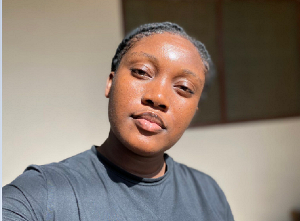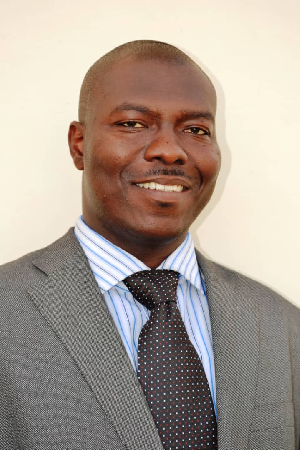- Home - News
- TWI News | TV
- Polls
- Year In Review
- News Archive
- Crime & Punishment
- Politics
- Regional
- Editorial
- Health
- Ghanaians Abroad
- Tabloid
- Africa
- Religion
- Election 2020
- Coronavirus
- News Videos | TV
- Photo Archives
- News Headlines
- Press Release
General News of Sunday, 3 June 2001
Source: Siobhan Redmond for Sunday Times
FEATURE: Into Africa's heart of darkness
In flight
Before I fly out to Ghana with Care, the aid agency I have been involved with for some time, I go to Michael Boyd's Royal Shakespeare Company productions of Henry VI Parts 1, 2 and 3 and Richard III at the Young Vic. I sit spellbound for 13 hours, only once remembering the slipped disc, which has turned me into a health bore of epic proportions.
When Gavin Marshall, who plays numerous roles, flies down a rope I think: "I can't do that now", as if I'd ever been able to - proper theatre makes you feel you can fly.
I read the five-star reviews on the plane from Gatwick, then Accra opens up like an oven and in we go.
Slave route
On the road to Tarkwa, we stop at the slave fort in Elmina. The local children, desperate to find sponsors to help them through school, have perfected a foolproof method of becoming unforgettable. Two wee boys introduce themselves to me and say they'll see me later with a present. Inside the fort, the Door of No Return is a narrow slit to stop the slaves escaping. The building smells like sadness. On the wall is written:
In everlasting memory
Of the anguish of our ancestors
May those who died rest in peace
May those who return find their roots
May humanity never again perpetuate such injustice against humanity
We, the living, vow to uphold this
My new friends wait outside with my present, which I'll treasure whenever I look at it - a seashell. Written on it in biro are the words "To Mrs Shaven From Your Friends Justice & Issac. God Bless." I wonder again why my father gave me an impossible name.
Better days
In Ghana the average daily wage is 50p and several millions don't make even that. Enrolment in schools is low, particularly for girls. The spread of HIV and AIDS affects one in 10 people. Care operates education, health, economic development and environmental projects that help communities to acquire basic amenities such as electricity and clean water.
At the farming village of Ebukofi Bekyere we are greeted by the chief, elders and dignitaries all wearing T-shirts bearing the slogan Girl Child Education. Madam Vera, the schoolteacher, is a role model for her pupils. She walks six kilometres each day to the school, which was extended using building materials supplied by Care. Pupil enrolment increased sixfold in a year.
At Gabia they are building a clinic for their healthcare volunteer, Joseph, who was chosen by the village to receive training from Care and to be the community's distribution agent. The women are too shy to volunteer but say they feel comfortable talking to Joseph about anything now.
Felicia, the midwife at Haman health centre, shows me with justifiable pride a bowl on a stand and an urn for hand-washing provided by Care. I am mortified at the contrast between what she works with and what I pretend to work with on the set of the BBC medical soap Holby City, where I am now employed. Dear God.
Top performance
The Ashanti region has the country's second highest rate of HIV; in Ahinsan and Ayaase we receive full ceremonial welcomes including discussions, testimonies, poems and plays on the subject of healthcare. I receive my first ever marriage proposal from a no-good-boyo who has never seen a white woman before but has clearly, like me, seen better days.
Vivienne, who is nine, gives a towering performance as a teenage mum. She has a dolly on her back and when she hurls it to the ground in fury at its wailing and at the sadness of her own life, she storms her audience into silence. I hope I'll see her on stage one day. I hope her talent makes her fly. Ayaase's chief says: "We all want to see God and today we are seeing the next best thing, for white people are here among us." I think of the slave fort. Africa - it spins your head and roasts your body.
On the breadline
Today it is hot enough to melt the varnish on my toenails. When a storm breaks and the temperature drops with the rain, I break into a jig, which tickles our driver Ernest mightily. "Who'd believe a white woman doing a rain dance?" he says.
Janet is dying of AIDS, she has six children and no family. Mavis, Care's field adviser in Obuasi, gives Janet and others in her hellish situation all the help she can, but who will look after the children when Janet dies? There is no money.
Our photographer gives her the $10 he has in his pocket and she falls at his feet weeping with gratitude. That will feed her family for a fortnight.
Amy, one of the prostitutes Mavis takes us to meet, has her name and that of her village tattooed on her arm.
She says: "So when I am murdered the police will find my brother and tell him." Each month a girl is killed. Amy has no alternative but to sell her body; her children must eat. High unemployment means she and her colleagues need retraining requiring funds Care doesn't have. The girls earn only 40p a trick but have decided to refuse clients who won't wear condoms.
In London I unpack my present from the wee boys at Elmina.
I'll tell their story, and Janet's and Amy's and Mavis's wherever I can. Tomorrow I go back to my shiny pretend ward to do what I do; Care will do what it does worldwide every day for as long as it can.
Siobhan Redmond is an actress. To make a donation to Care telephone: 0845 450 1228










